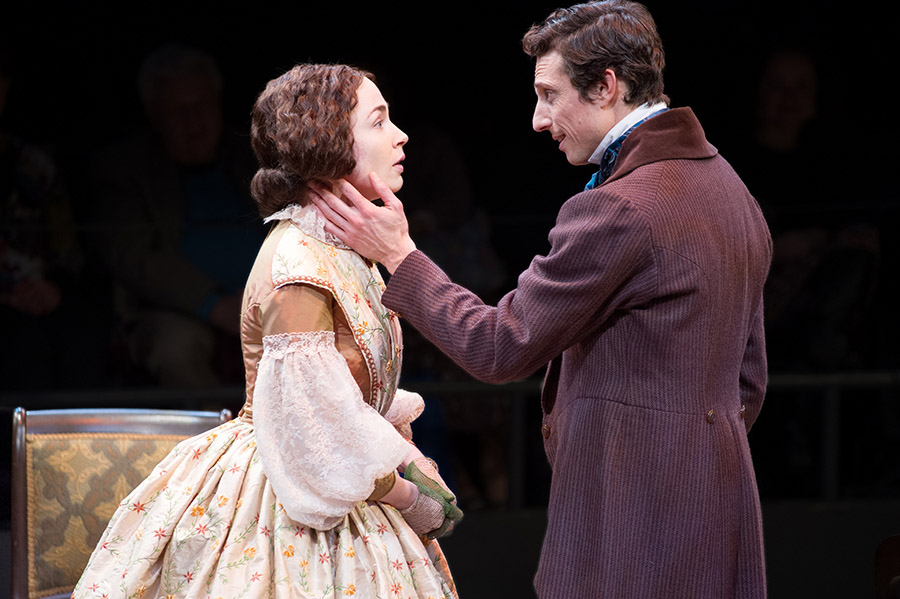Two women—one skittish and delicate, the other older and boisterous—contemplate the purpose of life as they lounge in a lavish 19th-century parlor. The young woman offers an answer: “It is to find someone to love.” “And someone to love you,” the elder rejoins with a smile. “That’s the same thing,” says her niece, simply and sadly.
Love is anything but straightforward for Catherine Sloper, the hesitant protagonist of The Heiress, Ruth and Augustus Goetz’s 1947 play about a woman who suffers the psychological ramifications of her father’s bitterness. Playing at Arena Stage’s in-the-round auditorium with Laura C. Harris in the titular role, the play plunges beneath well-dressed manners to unearth the fraught dynamics of gender and power that menace the Sloper home. When the arrival of a suitor signals Catherine’s first chance at romance, Victorian era politesse gives way to cruelty, and our heroine must fight for her own rebirth.
Despite the bleak premise, this production of The Heiress skirts overblown drama in favor of humanity’s most basic messiness. The cast of mostly women grounds the play in real emotion—everyone, from Kimberly Schraf as the Slopers’ long-suffering maid to the luminous Lorene Chesley as Catherine’s popular cousin, brings a warmth only possible through depth. When Dr. Sloper wants to confirm his suspicions about Catherine’s hasty courtship, he seeks the counsel of the most clear-headed characters of the play: his sister Elizabeth Almond (Janet Hayatshani) and Mrs. Montgomery (Lise Bruneau). Empathetic and firm, both are worthy allies.
Yet even Dr. Sloper’s misogyny is not so easily disavowed when embodied by the dignified James Whalen. With persuasive logic, Whalen plays Catherine’s father as a man whose condescension toward his daughter is the remnant of heartbreak and protective instinct, misplaced as they may be. There are parallels that can be drawn between the events of the play and the controversies of our current age, but Whalen makes Sloper into much more than a symbol to be spat on.
As Catherine, Harris is tasked with bearing the emotional journey of a woman convinced of her own dullness, yet desperate to be proven wrong. She is the heroine, but for a while, she seems to exist only on the margins, fidgeting with her hands while others more eloquent and worldly take up space. Hair pulled back into a severe chignon and drowning in a sumptuous cherry-red dress made by costume designer Ivania Stack, Catherine would rather sequester herself in the kitchen when company calls than face her father’s humiliating remarks. This meekness can be hard to stomach, but Harris, through her vulnerable performance, maintains our pity. Catherine’s turn from brokenness in Act 2 is wholly satisfying in Harris’ hands—a feminist happy ending that, if not completely triumphant, feels true.
“My favorite roles are the ones in which I get to experience the breadth and depth of the human experience in the time between lights up and curtain call, and The Heiress provides that in spades,” wrote Harris is an email to the Voice. “There’s no opportunity to blink, no chance for rest, and it is utterly exhausting, but in service of such a compelling character, that exhaustion is the height of professional satisfaction!”
Though the context is usually less than friendly, the script stays spry thanks to its looping, inventive witticisms. Whether engaged in banter or argument, the guests who pontificate in the drawing room are whip-smart and well-spoken, rendering Catherine’s awkwardness all the more conspicuous. “Help her to be clever. You are good for nothing unless you are clever,” pleads Sloper to his sister. It’s a rude request, but he has a point: In a world where entertaining guests is social capital, his daughter faces certain ruin.
The compliment, too, is an art form—one Catherine’s charismatic love interest Morris Townsend (Jonathan David Martin) has mastered to the chagrin of her father. Martin is thoroughly at home playing a lovesick admirer; his motives might be shady, but like Catherine, we are too enthralled by his unwavering attention to notice. His odd-couple rapport with Catherine’s gossipy aunt Lavinia Penniman (Nancy Robinette, who earned all of the night’s biggest laughs) is the show’s best comic relief. Lavinia delights in Morris’ charms and the future he represents for her niece; he, in turn, enjoys her company—or is it her access to Dr. Sloper’s fine cigars? Herein rests the cynicism of The Heiress: Not even our most cheerful characters can escape the quid pro quo nature of a certain pay grade.
It’s fitting that the play unfolds in-the-round within the suffocating bounds of a New York household, dressed to perfection by set designer Mikiko Suzuki MacAdams. (The Heiress’ creative team is all women, helmed by director Seema Sueko.) We are privy to every downturned mouth, every slump of the shoulder from a unique aerial view. It mimics, in some ways, the fishbowl effect that plagues New York high society. These insecurities resonate across time and status, the play’s themes as classic as a broken heart.
“[The people in Catherine’s life] try so hard to demand that she be or act a certain way,” wrote Harris, “and when our audiences collectively jeer those efforts, and collectively applaud Catherine along each step of her journey of self-discovery and actualization, it’s clear that this story hits a nerve in 2019.”
Fortunately for us, The Heiress is less concerned with being unlucky in love than it is with what Catherine must sacrifice when re-constructing herself from the shattered pieces of a past life. In doing so, she emerges hard and brittle, but closer to whole than ever before.







